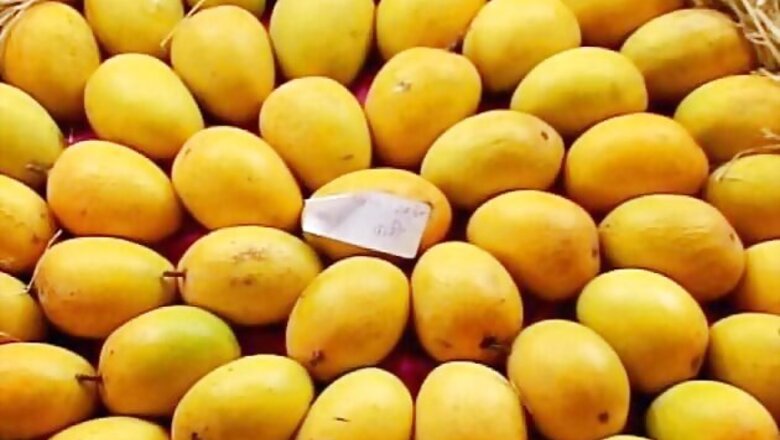
views
New Delhi: The European Union (EU) banning the import of Indian mangoes is good news for domestic consumers and really a shock for the mango growers and exporters. The price of the top quality Alphonso mango price has come down by Rs 100-150 per kilo in major markets like Delhi, Mumbai and Bangalore overnight. The growers fear that it may crash even further.
Unlike last year, this year is likely to witness a bumper crop of Mango. The growers were hoping to make more money by exporting it to its major market in Europe.
According to an estimate, total export from India is valued at Rs.250 crore per year. Mango known as "King of fruits" is one of India's main crops. According to agri-exchange, the fruit is cultivated in the largest area i.e. 2,312 thousand ha and the production is around 15.03 million tonnes, contributing 40.48 per cent of the total world production of mango. The main mango producing states in India are Uttar Pradesh (23.86 per cent), Andhra Pradesh (22.14 per cent), Karnataka (11.71 per cent), Bihar (8.79 per cent), Gujarat (6.00 per cent) and Tamil Nadu (5.09 per cent).
Total export of mangoes from India is 59.22 thousand tonnes, valuing Rs. 162.92 crore during 2010-11. India exports mango to over 40 countries worldwide. The major importing countries of India's Mangoes during the period of 2010-11 were UAE (61.79 per cent), Bangladesh (11.41 per cent), UK (8.92 per cent), Saudi Arabia (3.79 per cent), Kuwait (2.32 per cent), and Bahrain (2.19 per cent) respectively.
Uttar Pradesh is the leading mango producing state with production of 3,623.22 thousand tons followed by Andhra Pradesh state which has production of 3,363.40 thousand tonnes. Then comes Karnataka 1,778.75 thousand tonnes, followed by Bihar and Gujarat i.e. 1,334.87 and 911.30 thousand tonnes respectively. Area, production and productivity of mango in different states are given in table.
The Indian mango exporters are disappointed with this week's EU ban on the nation's mangoes. According to www.freshfruitportal.com, the CEO of Delicious Mangoes, Rajeev Srivastava, received an official memorandum from the Indian Ministry of Agriculture dated March 6, 2014 detailing how all fresh produce would be routed through pack houses from the Agricultural and Processed Food Products Export Development Authority (APEDA) before being exported to the EU. However, on Wednesday, Indian mangoes, eggplant, two types of gourd and the taro plant were banned from the European market following serious concerns about high levels of contamination, mainly from non-European fruit flies.
The emergency measure comes into effect on May 1, 2014 and follows a meeting of EU member states to discuss the shortcomings of the phytosantiary certification system for produce sent to the EU The ban will last until at least December 2015. This means that Delicious Mangoes will have to shelve plans to open up new export deals in the EU and instead find alternative markets in North and Latin America.
"As far as we know, all fresh produce including mangoes destined for EU countries from India will be processed at APEDA-certified pack houses. The new guidelines will be effective for the coming mango season 2014. In other words, Indian pack houses need to be APEDA-certified and the consignment should be checked and passed by APEDA," Srivastava said.
The mango exporters are now looking at North American and Latin American markets to prevent the mango price falling further.



















Comments
0 comment